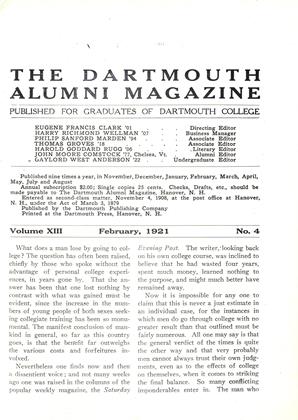Biloxi, Miss., January 14, 1921.
Editor DARTMOUTH ALUMNI MAGAZINE:
Dear Sir:
I have been very much interested in your discussion of the question of compulsory chapel service, and in the letters of Mr. Parkhurst and Mr. Parkinson, which it called out. Perhaps you have had additional letters from alumni on the subject, more, it may be, than you care to print, but I should like to state what seems to me the important consideration in support of chapel service, unless others have expressed the same idea, in which case there is no need of repetition.
Many reasons, more or less effective, may he given for a required service. It gets men up early in the day, a reason that will be more compelling with older than with younger men; it brings men face to face in the one common exercise of the College with its suggestion of a unified interest, a reason that does not appear of great weight in the hurry of a crowded entrance and a rapid exit; ii may tend to keep students from wandering away from Hanover, especially on Sunday, a reason that assigns to the chapel service the function of a monitor, a proctor or a police officer.
These reasons and others of a like kind are not the sufficient basis of a required chapel. The fundamental reason is that the chapel service is an essential part of a wellrounded college course. The true purpose of a college education is to develop character on the basis of education. To secure this end, the sound mind in a sound body, the college attempts to meet the physical, social, intellectual and moral needs of the students. For the first it offers a gymnasium, organized athletics and enforced recreation; for the second it has fraternities and various social clubs and functions; for the third it arranges its formal curriculum and its system of recitations and lectures, and provides its library; for the last it seeks to exert a general pervasive influence, and enforces discipline with its requirements and penalties for neglect of them.
But there is still one side of a character that these provisions do not touch, namely, the spiritual, and to meet them is the purpose of the chapel. The chapel is the one service of the College that appeals to the spiritual nature and to nothing else. For many years its service, as conducted at Dartmouth, has had no other end. It has not been a religious service, but a devotional one. No religious tenet has been enforced, no doctrine has been inculcated. Without regard to sect or creed its whole object has been to recognize in brief and simple form the relation of our common humanity to a divine Father, to start the day with an aspiration that has its impulse outside the crowding and perhaps- narrowing beauties of the late hours, and to give a sense of comradeship in the spiritual as well as in the other interests of life.
It may well be that the influence of one day may be slight, or wanting, or even adverse, but the reiterated appeal to that which is spiritual is as essential and as effective as any other college appeal. Not all in college become robust under physical training, not all attain the graces of social life, the rewards of scholarship, or the sanctions of morality, and all may not respond to the spiritual ap- peal, but a college can, with justice, no more neglect to meet the spiritual needs of its students than it can neglect their other needs.
A university that throws its students wholly upon their own initiative, may omit any one method of influence, but an institution that seeks to develop character, to make men, under a system of at least partial control, cannot reasonably omit to enforce its one appeal- to the spiritual nature of its students and to attempt to provide for the stimulus of that nature.
Sincerely yours,
 View Full Issue
View Full Issue
More From This Issue
-
 Article
ArticleWhat does a man lose by going to college ?
February 1921 -
 Article
ArticlePEN AND CAMERA SKETCHES OF HANOVER AND THE COLLEGE BEFORE THE CENTENNIAL
February 1921 By EDWIN J. BARTLETT, '72 -
 Sports
SportsBASKETBALL
February 1921 -
 Article
ArticleTHE LOG OF THE DARTMOUTH OUTING CLUB
February 1921 By LELAND GRIGGS '02 -
 Sports
SportsHOCKEY
February 1921 -
 Article
ArticleA DARTMOUTH PIONEER
February 1921







